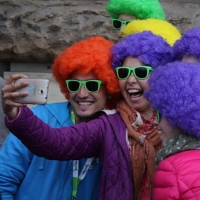The conviction that youth are drivers of positive change in our communities is the basis for the Youth Time International Movement’s programs and activities.
One special program is the Youth Time Summer School, which is a youth-led program that takes place in a different country every year. The Summer School brings together outstanding young leaders and active society members from all across the world to train them in a wide range of contexts. They are equipped with the necessary skills to build collective forms of thinking, and they have the opportunity to study key approaches to public diplomacy, conflict resolution, social integration, and stereotype elimination.
The 2015 Youth Time Summer School took place from June 18-22 2015 in the north German city of Hamburg. The topic of this year’s conference was Crisis and Society: Issues of Management.
“We are always in search of topics that can help young people develop themselves and expand their networks in the professional sphere,” Julia Kinash, president of the Youth Time International Movement
“What is really fascinating is that a young 5-year-old movement like Youth Time has already developed a very broad network of experienced people, a database with all the experts and trainers who have come to previous Summer Schools and who are still part of the network. They add valuable input to our work”, – Rens Saat, the event program manager and a Youth Time Movement representative from the Netherlands. Societies today are facing social disintegration, disengagement, and uncertainty among youth. The conflicts we have been witnessing in the last decade are increasingly severe and are propagating stereotypes that are threatening our societies, particularly the young populations. For these reasons, Youth Time Summer School offers its participants a unique space for learning and collaborating with a panel of experts and professors from a wide range of backgrounds.
“This program helped me develop my professional skills, learn how to deal with people, negotiate, and most of all prepared me to implement all this knowledge in my personal life when I go back to my home country. Anyone with a desire to develop effective leadership skills should participate in the Youth Time Summer School.”, – Souvik Lal Chakraborty, a participant from India.
The participants also had the opportunity to be exposed to diverse perspectives, epistemologies, and experiences that can help them contribute to greater understanding, intercultural exchange, and mutual respect.
Participants were encouraged to think beyond their regular daily reasoning in order to take context-sensitive actions in response to social crises and conflicts. More precisely, they took part in various workshops and training sessions that included team-building interactive activities, collaborative participation and feedback exchange.
“Youth Time Summer School is a real opportunity to learn more about negotiation, mediation and the youth projects that participants are working on in their home countries.”, – Michele Anello, a participant from Italy.
The experts who helped moderate and train the participants came from a wide range of fields, areas of expertise, and backgrounds. They trained the participants in topics including “Art of Negotiation” given by Mr. Sven Anger from Germany, “Breaking Stereotypes” with Mr. Adi Kolasevic from Bosnia and Herzegovina, “Daily Diplomacy” moderated by Mr. Dimitris Psarrakis from Greece, “Decision-making under Pressure” given by Ms. Katja Loose from Germany and “Conflict Reconciliation” with Jaron Reisman from the Netherlands, “How to defeat stress” by Mike Fisher from UK, “Noah’s Ark” and “Risk” games by Alexej Stepanov from Serbia.
“In Youth Time Summer School we have an international atmosphere, we come from different cultures, different countries, and hold different ideas and perspectives.”, – Marjean Nur, a participant from Kazakhstan.
The workshops also dealt with many rapidly-developing social phenomena that affect youth with respect to their inclusion in the decision-making process. Relevant examples are the issues of stereotypes and prejudice that have come to the forefront over the last few years. Another solid example is conflict transformation and reconciliation, which are fundamental elements in the peacebuilding process. The participants had the opportunity to broaden their knowledge of negotiating skills and stress management, two essential topics that are pressing issues in our fast-paced world.
“This program is a chance for participants to develop important skills that accompany them in their future by acting as diplomats, changing stereotypes, and reconstructing the entire history of the world.” — Dimitris Psarrakis, Financial Economist and Engineer, Greece
Youth Time Summer School invited young people around the world, regardless of their differences, to build alliances in and across their communities to better serve the causes that matter most to them. Helping them to develop as leaders and change agents and to leverage their key resources means assisting them in making the world a better place.
Here you can see how the Youth Time Summer School 2015 was passing:
Video from our media collaborate Portal Mladi:
“European Youth Press – network of young media makers” about the Summer School 2015: YouthTime: Get introduced to a new wave of youth activism!
You can learn more about the Youth Time Summer School 2015 by using hash-tag #YTSummer for social networks or just visit the media-portal youthtimemag.com.
By Ala Oueslati

